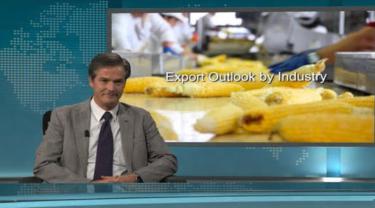‘Challenging’ is not a strong enough word to describe my last two annual visits to Mexico. Oh, I always look forward to catching up on the latest Mexican-Canadian business forays, discussing the local economy with analysts and officials, the warm hospitality, not to mention the warm weather (right now, Canada is in a deep freeze!). But lately, January hasn’t been this country’s best month. Last year, it was Week 1 of the new US Administration, complete with the announcement (and immediate withdrawal) of a border adjustment tax. This year, NAFTA hangs in the balance, and a general election is imminent. Is this just a repeat of last year’s fiasco, or is this a more serious Mexico moment?
NAFTA rounds continue to threaten freer trade in Mexico
The current US Administration’s about-face on trade policy is nothing if not dramatic. When NAFTA was agreed, the border became more fluid, the Maquiladoras were set up, and so on. It was an intentional policy that recognized that higher trade and investment deficits – for a season – were a worthy price for the US to pay to lower illegal immigration, illicit business activity and corruption. Freer trade and cross-border investment has given hope to a new generation of Mexicans who no longer have to flee to succeed. Current US policy threatens to undo that, with potentially serious consequences.
So far, the political bluster hasn’t blitzed Mexico’s economy. 2017 growth is set to reach 2.2 per cent. Exports have managed to post a respectable 2.8 per cent increase. Moreover, foreign direct investment into Mexico will easily surpass $20 billion, which is shy of record territory, but still an impressive number. As in Canada, Mexican business has barreled on, capitalizing on the upsurge of global growth.
Maintaining the status quo is becoming increasingly difficult. With the US upping its threats to cancel NAFTA, businesses face serious real-life decisions. Supply-chain risk is at the very least causing businesses to develop risk plans for sourcing. The prospect of new content rules is affecting location decisions. Foreign multinationals are more reticent about being under the White House’s microscope regarding current or prospective Mexican operations.
Mexican business investment at risk
In fact, on a number of fronts, it’s business investment in Mexico that’s most at risk. Proposed changes to current trade architecture are the big factor, but there are broader implications. With Mexico staring down the July 1 elections, the very real possibility of a U-turn in policy direction adds great uncertainty to the business climate. A populist shift to a more contentious and less business-friendly leader may exacerbate the situation, weighing against future investment projects.
The implied fiscal insecurity is another factor. Businesses add future tax liabilities into their investment equations; uncertainty on that front changes things. Moreover, government incentives have been instrumental in drawing investment to Mexico; lower capacity to fund new business ventures would be a drawback. Political change would also throw deregulation and privatization policies into doubt. Loss of economic activity also raises the spectre of the security factor and the rise of illicit business, which by its nature often capitalizes on economic deterioration.
If NAFTA unravels, nobody wins
The prospect of a throwback to poorer times is particularly frustrating, as for all parties concerned, it’s all so unnecessary. First of all, the notion that Mexico is stealing jobs from other nations doesn’t square with the data. The US has a 4.1 per cent unemployment rate, Canada’s is moving in on 5 per cent, and Western Europe is moving toward cyclical lows. True, the lower level of overall labour market engagement is exaggerating the success, but even that is changing for the better. A second related fact is that global growth is rising more rapidly than anyone expected – there seems to be plenty for everyone, without tit-for-tat protectionism. Third, a wide body of theory and now decades of practice prove that more restrictive trade is bad for everyone, including the perpetrators. Mexico stands to lose the most if the deal unravels – but they will be one of three on the loser podium; ultimately, nobody wins.
The bottom line?
Mexico is benefiting from a rise in global growth, good news for Canadian exporters and investors in the market. So far, that ‘rising tide that lifts all boats’ is working. Poke holes in one or more of those boats, and they become a liability for the all the other ships in the harbour.

















